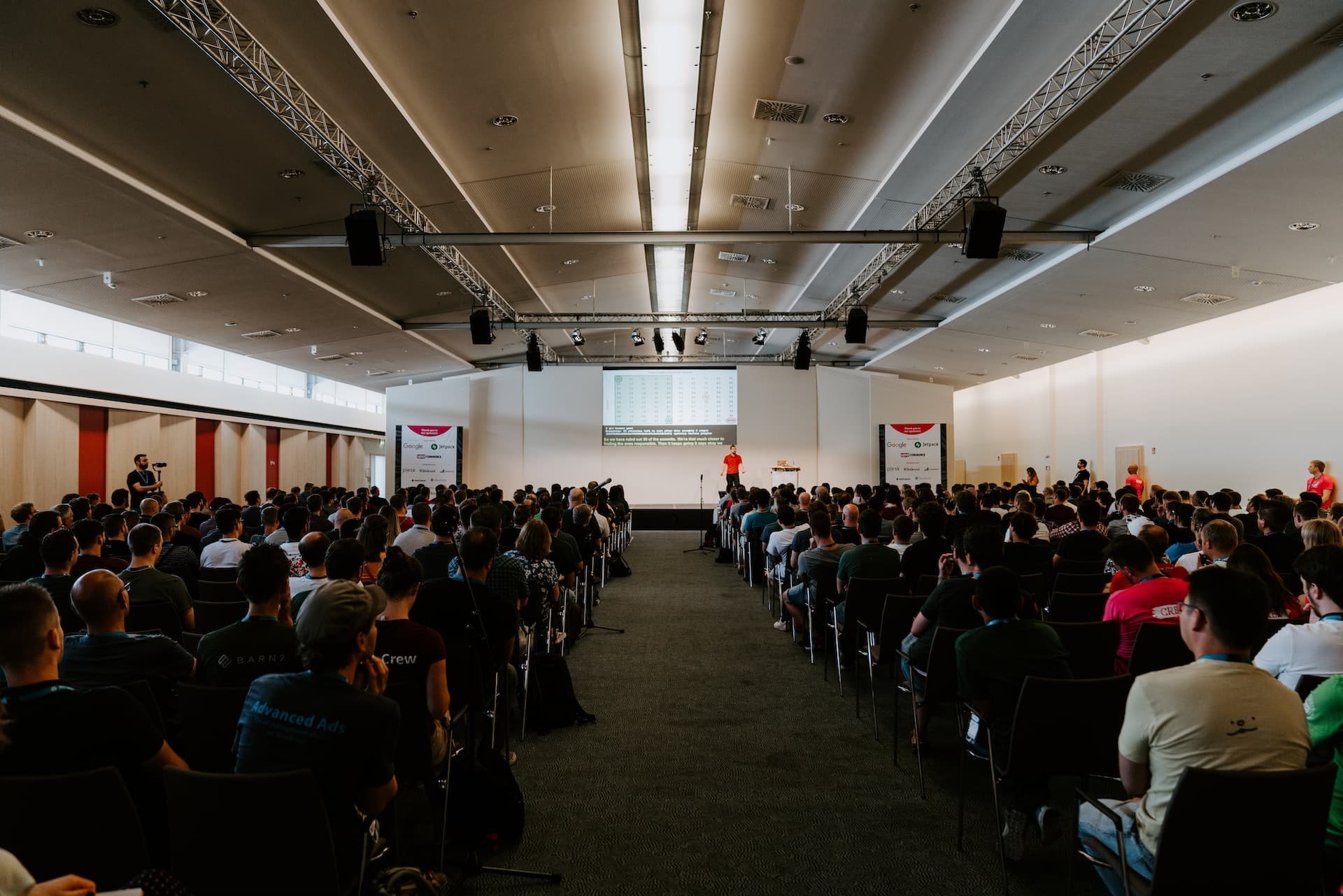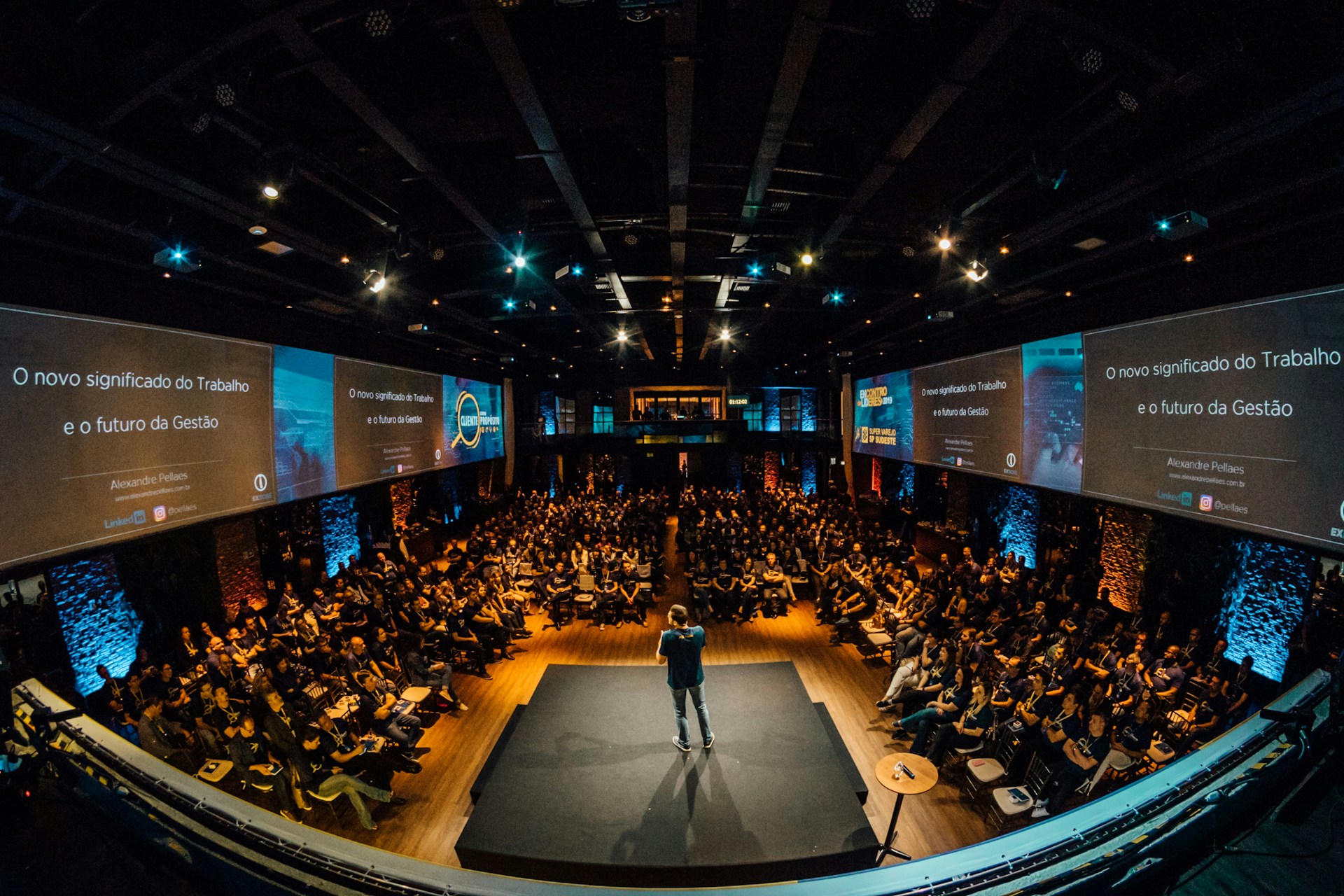Virtual events have rapidly emerged as a pivotal element of modern event planning, transforming how we connect, engage, and share information. In an ever-evolving and changing digital landscape, the importance of virtual events cannot be overstated. They bridge geographical gaps, break down barriers to participation, and offer unparalleled flexibility, making them a valuable asset in event planning.
The art of virtual event planning is at the core of successful virtual events. This dynamic and forward-thinking approach to event organization has become essential today. Whether you’re an event professional looking to expand your horizons or someone new to event planning, understanding the nuances of virtual event planning is the key to unlocking unparalleled success in the digital realm. Moreover, as we dive into the intricacies of these large virtual gatherings, our EMRG Media team knows how to make the finest displays come to life seamlessly.
Virtual event planning is not just a buzzword but a strategic discipline orchestrating every facet of digital gathering. It’s a multifaceted process requiring unique skills and expertise, from selecting the right technology to curating engaging content and fostering meaningful interactions. So, this comprehensive guide delves deep into virtual event planning, providing insights, strategies, and real-world examples you need to excel in the digital event landscape.
Understanding the Virtual Event Landscape
What Are Virtual Events?
Virtual events are digital gatherings that unite individuals worldwide in a virtual environment. Additionally, they encompass various formats, from webinars and virtual conferences to online trade shows and interactive workshops. Unlike traditional in-person events, virtual events occur entirely online, enabling participants to attend from the comfort of their homes or offices.
Virtual vs. In-Person Events: A Comparative Analysis
It’s crucial to compare them with traditional in-person gatherings to grasp the significance of virtual events:
- Accessibility: Virtual events eliminate geographical limitations, allowing attendees from anywhere to participate, expanding your potential audience exponentially.
- Cost-Effectiveness: Virtual events often require fewer resources and lower overhead costs, creating a budget-friendly option for organizers and attendees.
- Flexibility: Attendees can choose when and where to participate, accommodating diverse schedules and time zones.
- Data and Analytics: Virtual events provide robust data and analytics, allowing organizers to track attendee behavior and gather valuable insights.
Growth and Trends in Virtual Events
The rise of virtual events has been remarkable, and this event trend is poised to continue its upward trajectory. Additionally, their popularity extends beyond pandemic-induced constraints.
- Hybrid Events: Blending virtual and in-person elements is gaining traction, offering a hybrid approach that caters to diverse preferences.
- Enhanced Engagement Tools: Innovations in engagement tools, such as virtual reality (VR) and augmented reality (AR), are elevating the virtual event experience.
- Sustainability: Virtual events align with sustainability goals, reducing the carbon footprint associated with event travel and physical gatherings.
Virtual Event Planning: Setting Clear Objectives
Defining Event Goals and Objectives
Before diving into the intricate details of virtual event planning, it’s imperative to establish clear and measurable goals and objectives for your event. So, what is it that you want to achieve with your virtual gathering? Whether it’s increasing brand awareness, generating leads, or educating your audience, defining your goals will be the foundation for your event planning strategy.
Start by asking questions like:
- What are the primary objectives of the event?
- What specific outcomes do you hope to achieve?
- How will you measure the success of your virtual event?
By defining these objectives upfront, you’ll ensure that every detail of your event planning is aligned with your overarching goals.
Identifying Target Audiences and Their Needs
Understanding your audience is paramount in crafting a virtual event that resonates with participants. Therefore, identify your target audience segments and gain insights into their preferences, interests, and pain points. What are their expectations from your event, and how can you cater to their needs?
Consider factors such as:
- Demographics: Who makes up your audience regarding age, gender, location, and profession?
- Psychographics: What are their values, interests, and motivations?
- Pain Points: What challenges or issues can your event address or solve for them?
Knowing your audience inside and out allows you to tailor your virtual event to speak directly to their needs and preferences.
Establishing Key Performance Indicators (KPIs)
Key Performance Indicators (KPIs) are the compass that guides your event’s success. Moreover, these measurable metrics help you track progress, evaluate performance, and determine whether your event achieved its objectives. Your KPIs should align closely with your event goals and can include metrics like:
- Attendance and Registration Numbers
- Engagement Rates (e.g., chat interactions, polls, Q&A)
- Lead Generation and Conversion Rates
- Revenue Generated
- Audience Satisfaction Scores
Clearly defined KPIs will allow you to measure your event’s impact and make data-driven decisions for future improvements.
Virtual Event Planning: Technology Selection
Choosing the Right Virtual Event Platform
Selecting the appropriate virtual event platform is one of the most critical decisions you’ll make during planning. Also, the virtual platform you choose will impact the overall experience for organizers and attendees. Factors to consider when selecting your virtual event platform include:
- Scalability: Ensure the platform can accommodate your expected audience size.
- Features and Capabilities: Look for features like live streaming, interactive tools, and networking opportunities.
- Customization: The ability to tailor the platform to match your event’s branding and needs.
- Technical Support: Access to reliable technical support during the event.
Features to Consider When Evaluating Platforms
When evaluating virtual event platforms, watch for features that enhance engagement, networking, and overall attendee experience. For example, these may include:
- Interactive Session Tools: Live polls, Q&A, and audience chat functionalities.
- Networking Opportunities: Virtual lounges, breakout rooms, and attendee matchmaking.
- Analytics and Reporting: Robust event data collection and reporting capabilities.
- Content Delivery: Options for pre-recorded and live content delivery.
Real-World Examples of Effective Platforms
To illustrate the importance of platform selection, we’ll showcase real-world examples of platforms that have excelled in providing a seamless and engaging virtual event experience. These examples will highlight the impact of technology in achieving event objectives and satisfying attendees.
Virtual Event Planning: Designing Engaging Content
Crafting Content Tailored to Virtual Audiences
Virtual events require a unique approach to content creation. To captivate your virtual audience, you must tailor your content to suit the digital medium. Consider factors like the attention span of online participants and the need for interactive elements. So, craft your presentations and materials with the virtual attendee experience in mind, ensuring they are engaging, informative, and easy to digest.
Strategies for Interactive and Engaging Presentations
Keeping virtual attendees engaged is an ongoing challenge. Incorporating interactive elements into your presentations can make a significant difference. Explore strategies such as:
- Live Polls: Polling the audience on relevant topics to gather insights and keep participants actively involved.
- Q&A Sessions: Encourage questions from attendees and address them in real-time during presentations.
- Breakout Discussions: Creating opportunities for smaller group discussions and peer interaction.
- Gamification: Incorporating game-like elements to make learning and engagement more fun and rewarding.
Leveraging Multimedia Elements
Multimedia elements add depth and variety to your virtual event’s content. Utilize visuals, videos, animations, and infographics to enhance your presentations and convey information more engagingly. Multimedia not only captures attention but also aids in simplifying complex concepts and fostering better understanding among your virtual audience.
Virtual Event Planning: Audience Engagement Strategies
Techniques to Keep Virtual Attendees Engaged
Audience engagement is the top priority of any successful virtual event. Keeping participants engaged throughout the event is a priority. Employ techniques like:
- Encouraging Participation: Actively involve attendees through questions, polls, and discussions.
- Virtual Networking: Facilitate connections between attendees through virtual lounges and networking sessions.
- Live Interactions: Engage with your audience in real-time, acknowledging their comments and questions.
Incorporating Live Polls, Q&A Sessions, and Gamification
Engagement features are indispensable in the virtual event landscape. Live polls allow for instant feedback and make attendees feel heard. Q&A sessions promote interaction and provide valuable insights. Gamification adds element of fun and competition, increasing participation and knowledge retention.
Case Studies of Successful Audience Engagement
To illustrate the effectiveness of various engagement strategies, we’ll delve into real-world case studies of successful audience engagement. These examples showcase how organizations have leveraged engagement techniques to create memorable virtual event experiences.
Pre-Event Promotion
Building Anticipation Through Pre-Event Marketing
The overall success of your virtual event often begins with pre-event promotion. Build excitement and anticipation by strategically marketing your event well in advance. Leverage various channels such as:
- Social Media: Utilize platforms like Twitter, LinkedIn, and Instagram to create buzz and engage with potential attendees.
- Email Marketing: Send your target audience personalized invitations, updates, and reminders.
- Partnerships and Collaborations: Partner with influencers, industry experts, or complementary organizations to expand your reach.
Tips for Generating Buzz Around Your Virtual Event
Creating a buzz around your virtual event involves more than just announcements. Share teasers, sneak peeks, and behind-the-scenes content to generate interest. Consider running contests or offering exclusive early-access opportunities. The goal is to build excitement and curiosity leading up to your event.
Event Execution
The Importance of Rehearsal and Testing
A smooth virtual event execution hinges on meticulous planning and thorough rehearsal. Rehearse every aspect of your event, from technical setups to presenter rehearsals. Testing all systems, platforms, and equipment beforehand will help identify and resolve potential issues.
Managing Technical Issues and Troubleshooting
Despite careful preparation, technical issues can arise during your event. Having a dedicated technical team and contingency plans in place is crucial. Equip your team with troubleshooting protocols to address issues swiftly and minimize disruptions.
Ensuring a Smooth and Glitch-Free Event
The success of your virtual event relies on delivering a seamless and glitch-free experience for attendees. Implement redundancy for critical systems, have backup plans for internet connectivity, and provide clear instructions for attendees on troubleshooting common technical issues. A smooth event execution ensures your audience remains engaged and satisfied throughout the virtual experience.
Post-Event Evaluation
Analyzing Event Data and KPIs
Once your virtual event has concluded, the work isn’t over. It’s time to dive into the data and assess how well you achieved your goals and objectives. Analyze the event data and KPIs you established earlier to gain insights into your event’s performance. Measure attendance rates, engagement metrics, lead generation, and other relevant data points. This data-driven approach to events allows you to gauge the success of your event objectively.
Collecting Feedback and Attendee Insights
Direct feedback from attendees is invaluable. Solicit feedback through post-event surveys or evaluations to understand what went well and where there is room for improvement. Ask participants about their overall experience, content quality, and engagement levels. Actively listening to your attendees’ insights provides valuable guidance for future events.
Identifying Areas for Improvement
Post-event evaluation should lead to actionable insights. Identify areas where your virtual event excelled and areas that need improvement. Are there technical glitches that need addressing? Were there engagement elements that particularly resonated with attendees? Use these insights to refine your virtual event planning process for future endeavors.
FAQs About Virtual Event Planning
Why is virtual event planning important?
Virtual event planning involves the strategic organization and execution of online gatherings, conferences, or webinars. It’s essential because it allows businesses and organizations to reach global audiences, reduce costs associated with physical events, and adapt to changing circumstances, such as the need for social distancing.
How does virtual event planning differ from in-person event planning?
Virtual event planning differs from in-person planning, including the absence of physical venues, the use of digital platforms, and the need for engaging online content and interactivity.
What are the essential steps for planning a successful virtual event?
The essential steps include setting clear objectives, selecting the right technology, designing engaging content, fostering audience engagement, promoting the event effectively, ensuring a smooth execution, and evaluating the event’s success.
How can I select the right virtual event planning platform for my specific needs?
Choose a virtual event platform based on your event’s goals, audience size, features required (e.g., live streaming, networking tools), and budget. Research and compare different platforms to find the best fit.
Key Takeaways on Virtual Event Planning Success
In this comprehensive guide to virtual event planning, we’ve journeyed through the intricacies of orchestrating successful virtual gatherings. From setting clear objectives and selecting the right technology to designing engaging content and ensuring flawless execution, we’ve covered every facet of the virtual event landscape.
The guide’s key takeaways emphasize that effective virtual event planning is a skill and a strategic discipline essential in our increasingly digital world. Whether you’re a seasoned event professional or a newcomer, the principles and strategies outlined here are your blueprint for success in the virtual event arena.
Do you want help in navigating virtual event planning in NYC? Look no further than EMRG Media, a leader in large-scale event management. Contact us today for expert event management. Let’s create extraordinary events together!






